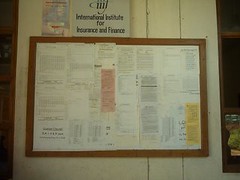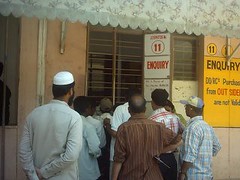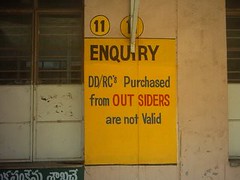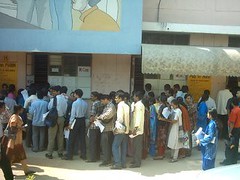Transaction costs and Osmania University
I was introduced to the economic term "Transaction Costs" by Atanu Dey. Atanu wrote sometime back about his experience in Mumbai in buying a refrigerator. He then expounded the idea of transaction costs from that.
Today, I spent a better part of a rather sunny and hot day in Hyderabad trying to submit the examination form for my wife, who is writing her Masters in Maths exams.
The experience reminded me of 'transaction costs' and how it is hurting the entire Indian economy.
So What exactly is a transaction cost?
The time and money spent trying to exchange financial assets, goods, or services.
Source Link
That is the simplistic explanation. Wikipedia explains it better.
In economics and related disciplines, a transaction cost is a cost incurred in making an economic exchange. For example, most people, when buying or selling a stock, must pay a commission to their broker; that commission is a transaction cost of doing the stock deal. Or consider buying a banana from a store; to purchase the banana, your costs will be not only the price of the banana itself, but also the energy and effort it requires to travel from your house to the store and back, and the time waiting in line, and the effort of the paying itself; the costs above and beyond the cost of the banana are the transaction costs. When rationally evaluating a potential transaction, it is important not to neglect transaction costs that might prove significant.The "costs above and beyond the cost of the banana are the transaction costs". This is very important to understand. Let me explain that with my experience today.
My task was simplistic. I had to submit the examination form for the Masters in Maths examination for my wife. She is studying at the Center for Distance Education, Osmania University. Osmania University is one of the biggest universities in India in terms of the number of students enrolled. The university follows a peculiar program where the various courses available in the university is "outsourced" to other education institutions which follow the guidelines of the university. "Franchising" can be a better term. The degree is granted by the university however, nobody really studies in the university. You go to colleges, the educational institutions located in various concrete buildings trying to 'educate' the masses.
Consider that for the city of Hyderabad and a large part of the state of Andhra Pradesh Osmania University is the only university. There is the Hyderabad Central University which acts like the traditional US university and hence not many students pass from it. I digress. The reason I digressed was to show the importance of the University. Hyderabad has a population of over 6 million and has one university. Adelaide has a population of 1.2 million and has 3 universities. The bigger difference though is that all the students study in the university campus.
Now the Osmania Univ started a distance education division catering to the multitude of education hopefuls who have planned to study while working. Great!
Now the procedure for paying the examination fees.
 If you cannot find information on this notice board you can use the services of the enquiry window.
If you cannot find information on this notice board you can use the services of the enquiry window.The first part of the program is to know the cost of the form, the dispensing "window", the method of payment. You need to ask at the enquiry counter. (image below)
 The enquiry counter is a masterpiece of design engineering. A window with many steel bars acts as the gateway of information for thousands of people. There are no bars for guiding people to stand in a line nor is there discipline among the students. After you crowd over the counter and find the information you find another counter which is to the left of this window (counter no. 4) and ask for the form.
The enquiry counter is a masterpiece of design engineering. A window with many steel bars acts as the gateway of information for thousands of people. There are no bars for guiding people to stand in a line nor is there discipline among the students. After you crowd over the counter and find the information you find another counter which is to the left of this window (counter no. 4) and ask for the form.The cost of the form is Rs. 20. The payment method, through a demand draft (DD). No cash. No credit card and of course, no cheque. For the princely sum of Rs. 20, you may 'transaction charges' of Rs. 20 to the bank to get the DD. To help the students, there is the following information provided everywhere.
 For some crazy reason this confusing information is provided. Since the Osmania Univ has this peculiar habit of not accepting cash for the services it renders, everything has to be payed through a demand draft or payorder. Some guy figured out that he can provide a service by buying the DDs before and selling. This board is supposed to warn the students against buying from that. I do not know how it makes sense!
For some crazy reason this confusing information is provided. Since the Osmania Univ has this peculiar habit of not accepting cash for the services it renders, everything has to be payed through a demand draft or payorder. Some guy figured out that he can provide a service by buying the DDs before and selling. This board is supposed to warn the students against buying from that. I do not know how it makes sense!The sad part was that a large number of the students interpreted this information as "DDs from other banks not accepted". There is a resident State Bank of Hyderabad branch in the premises, hence the confusion. Hundreds of students wasted thousands of hours today to buy the DD from only one branch. Sadly nobody explained this to them.
After you spend a large part of your time buying a DDs for the form, examination fees etc from a nationalized bank (no private banks please). You then need to wait till the lunch recess is over and then stand in queue to submit the form.
 The payment queue has an amazing design and planning to help make it easier to submit the application.
The payment queue has an amazing design and planning to help make it easier to submit the application.Ok. This is the end. Now coming to the real point. I spent almost 4 hours in the hot sun today to submit one application. So has some hundreds of other students. These various exercises that we undertook to complete this task are the "entire transaction costs". If you add all these small costs and multiply it by the thousands of students and again multiplying this for every exam in every university in India then you suddenly start to realize the economic loss.
Add to all this, since this is a distance education center a large number of the students were working. Imagine the loss of losing half day of your work for this. There is no choice as there are no evening services for them.
This is important. We can also add the agony, emotional pain, physical pain, time spent, opportunity costs to the 'money cost' of the process to get the 'entire transaction costs'.
The university on their part could have done many many things.
- Accept cash.
- Provide clear signs and directions.
- Collect examination fees as part of course fees.
- Start flexible timings along with working on Saturdays and Sundays.
- Design payment systems better.
- Understand work flow and implement it.
- Think!
Sadly, monopolists are tough to change especially when they are government nominated.
If this is the state of the education provider imagine the state of the education provided.





0 Comments:
Post a Comment
<< Home